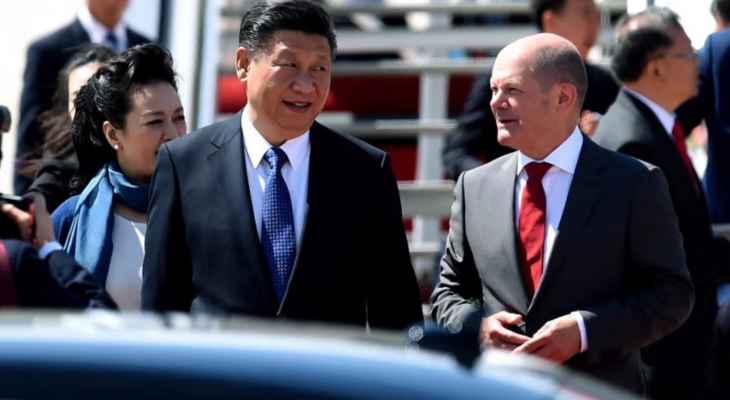Politico magazine suggested that Germany cannot “stand up” or take a “harder” approach to China, as it did to counter the Russian invasion of Ukraine, even if it invades the island of Taiwan, because Berlin’s economy depends on Beijing more. than from him. depends on Moscow.
And the magazine said in a report it published that Berlin was at odds with its allies for months after it adopted a “one step forward, two steps back” approach to confront Russia, but the issue seems to be nothing more than a prelude. on what could happen in Asia, where tensions over Taiwan and Berlin are balanced by how they would react if Beijing tried to seize an island it considers a breakaway region.
If that happens, the US and its allies will push for tougher sanctions against China. However, Germany is unlikely to be among those countries, a path that could protect its export-oriented economy but damage both its and Europe’s international standing, according to the magazine.
The magazine noted that German Chancellor Olaf Schultz, when asked on Thursday whether Germany could back sanctions that would be imposed on China if it invades Taiwan, evaded when he blamed the industrial sector. in Germany for ignoring the principle of “don’t put all your eggs in one basket”.
“The question of our country’s dependency in critical areas of supply chains, raw materials and other things is a necessary component of our national security strategy, which we are currently working on,” Schultz added, without naming China.
Others, however, have been more outspoken, including prominent center-right MP Norbert Röttgen, who told German television earlier this week that “German industry’s reliance on exports has created a dependency that renders us powerless.”
Asked if Berlin could support sanctions against Beijing, Röttgen, a former minister and veteran chairman of the German parliament’s foreign policy committee, replied: “I don’t think so yet.”
While the disagreement is in many ways reminiscent of what Germany has called “crazy concern” about the possibility and how to confront Russia over its invasion of Ukraine, this time around, the magazine says, the situation is more vulnerable.
The magazine pointed out that Germany’s great concern about “opposing” Moscow was the loss of access to cheap energy, and, together with Beijing, the loss of the basis of its economic prosperity.
In recent years, China has become Germany’s largest trading partner, overtaking the United States, accounting for almost 10% of the country’s foreign trade, which last year amounted to 2.6 trillion euros.
Moreover, China, which has driven the German economy for decades, remains the main driver of growth. This is why reducing German industry’s dependence on Beijing is “easier said than done.”
“The extent to which China finances our prosperity is greatly underestimated in this country,” the magazine was quoted as saying in a recent interview by Volkswagen automaker CEO Herbert Dies.
This vital sector is heavily dependent on China, where one in three vehicles made by German automakers are sold in China. The companies also have a large network of factories in China, which produced 4.3 million vehicles in 2021 alone.
“The German auto industry, like the rest of the world, is watching with concern the tensions between China and Taiwan,” a spokesman for the auto industry’s lobbying arm known as the VDA quoted the magazine as saying.
In Germany’s other major export sectors, from chemicals to machinery, it is not much different. About 1.1 million jobs in Germany, or 2.4 percent of all jobs, are directly dependent on consumption in China, according to a June study by the Cologne-based German Economic Institute.
Although Germany and the rest of the European Union are also important markets for China, the study shows that the Chinese are reducing their dependence on the region, while Europe is opening up more and more to China.
In an urgent appeal, study author Jürgen Mattis said it was “time for Europe and Germany” to change course and reduce their economic dependence on China.
However, just as it took decades for German industry to settle in China, the recession will not come suddenly, especially since there are few regions in the world that offer growth as safe as China, hence Germany’s predicament.
Mattis concluded that “in the event of a Chinese invasion of Taiwan, followed by wide-ranging Western sanctions, lower exports and revenues, and the suspension of supplies from China, would lead to significant economic losses in the European Union and especially in Germany.” .”
Given these forecasts, Germany’s support for significant Western sanctions is questionable, the magazine said. While Berlin backed a crackdown on Moscow after the massive invasion of Ukraine in February, the potential economic impact on Germany was “limited.”
For example, even when Schultz suspended the controversial Nord Stream 2 gas pipeline project with Russia, he also tried to protect Germany’s core energy interests by rejecting calls for a total gas ban. However, this strategy did not succeed, as the Russians themselves cut the supply of natural gas to Europe.
The magazine predicted that Germany’s persistent gas shortage, which threatens to destroy key industrial sectors, will inevitably influence the Berlin government’s response to a possible Chinese invasion of Taiwan.
With inflation soaring and no sign of falling energy prices, Germany cannot afford another blow to its fragile economy.
The magazine concluded by saying that officials in Berlin are privately acknowledging that Germany will be unable to support anything other than symbolic sanctions against China. That doesn’t mean there won’t be a dramatic debate in Berlin over the country’s latest moral dilemma.
She added that “political negotiations will be devoted to discussing the issue for hours, and newspaper columnists will pour barrels of ink to dissect every corner. But in terms of content, ordinary Germans will present:” Nothing “”.
Source: El Nashra
